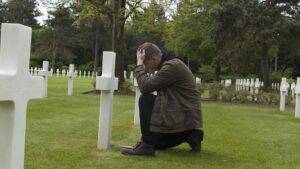Empowering others brings Christmas alive in our communities…feeling sorry for ourselves blocks Christmas
As I prepare the homily, our various Oblate communities are mourning the loss of two wonderful people: one a fine young man from Kionyo who died on Tuesday after a hit-and-run car accident last Friday; the other a lovely elderly lady: wife to a former Catechist at Nyaagi.
Death always knocks the wind out of us. But it’s more difficult when we die young. Can Advent help us through the grieving process? What is Advent?
In theory, it’s a joyful preparation to re-welcome God into our lives again. To prepare well, we must shrug off the sadness and bad events of yesterday, so we can be present and listen to the voice of God’s prophet: the Call is to be attentive and vigilant (thanks, Fr Jun Mercado OMI).
 How do we do that when we are grieving? It’s not easy. What’s easy is to wallow in our self-pity and cry for too long. Crying is important for a time. If we truly love someone, sadness must invade us. But we must never allow sadness to engulf us completely =depression.
How do we do that when we are grieving? It’s not easy. What’s easy is to wallow in our self-pity and cry for too long. Crying is important for a time. If we truly love someone, sadness must invade us. But we must never allow sadness to engulf us completely =depression.
God created us for life: first here on earth, and second, in Heaven. As we mourn the loss of our beloved family members and friends, at the front of our minds, we have to keep thinking: our destiny is Heaven.
Then, when a beloved member dies, we are sad because they’ve gone early but, with faith, we ask God to forgive them any mistakes and pray for them to enter Heaven: we help them most of all by helping other people around us to live life to the full.
In that way, we ourselves become the Christmas Crib where Emmanuel (God-made-man) enters into the world again: through us, and into the lives of our family and friends. I offer this, not because it’s easy, but because it provides a valid roadmap for us to follow.
When death visits us, often, we don’t know what to do: that’s why our culture and Church give us certain rituals and procedures to follow: we do them, perhaps reluctantly, but they always provide us with a certain sense of calmness: we’ve done something to help our loved one.
However, after the funeral: what do we do then? I’m suggesting, we help others live a full life while they are able, and while we are able. In helping others experience a fuller life, we are giving glory to God.
Every time we empower others: new vision, new opportunities, new knowledge, new skills, etc. we re-create Christmas in our own time(s). To empower others requires of us:
1. Joyful preparation (we are excited for the other & want to ensure we give something good);
2. We stop thinking about the sadness of yesterday
(Confucius say: man who walk and look over shoulder, fall over!);
3. We stop for silence: to think, to listen, to pray: and listen to the one we want to empower.
Point 2. above is easy to say but it’s not so easy to stop thinking about ‘yesterday.’ Although Confession/ Reconciliation is not popular these days, it’s an import gift/ tool that God has given us: it gives us humility, love and ‘another chance’ =freedom.
Reconciliation is not popular, but have you noticed that, as more people run away from Church, from Reconciliation, etc. the number of people in depression and committing suicide are increasing in large numbers? There is a link: if we are humble enough to stop and think.
In the First Reading, the prophet speaks words that we might want to say to God: “Oh, that you would tear the heavens open and come down…” Well, when we receive absolution in Reconciliation, isn’t God tearing open the heavens?
Again the First Reading says: “No one invoked your name or roused himself to catch hold of you.” How foolish are we not to reach out to catch hold of God through Reconciliation and Eucharist?
I pray we might recite the Responsorial Psalm with real desire and intention: “Lord, make us turn to you, let us see your face and we shall be saved.”
Finally, the Gospel exhorts us to “Be on your guard, stay awake, because you never know when the time will come…” The time for what?
The time to empower someone else: a kind word here and there; or taking time to stop and listen; or to share a little of our food. We must guard against being too busy! (I’m a great sinner in that regard, sorry!)
As we prepare for Christmas, perhaps the first place we can start the joyful preparation is at home with our family members, saying: “I’m sorry, I’ll do better.”
By Gerard Conlan, OMI


